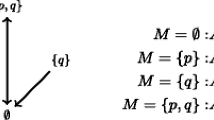Abstract
This paper presents a new modal logic for ceteris paribus preferences understood in the sense of “all other things being equal”. This reading goes back to the seminal work of Von Wright in the early 1960’s and has returned in computer science in the 1990’s and in more abstract “dependency logics” today. We show how it differs from ceteris paribus as “all other things being normal”, which is used in contexts with preference defeaters. We provide a semantic analysis and several completeness theorems. We show how our system links up with Von Wright’s work, and how it applies to game-theoretic solution concepts, to agenda setting in investigation, and to preference change. We finally consider its relation with infinitary modal logics.
Similar content being viewed by others
References
van Benthem, J. (1987). Verisimilitude and conditionals. In T. Kuipers (Ed.), What is closer-to-the-truth? (pp. 103–128). Amsterdam: Rodopi.
van Benthem, J. (2007). Dynamic logic for belief revision. Journal of Applied Non-classical Logic, 17(2), 129–155.
van Benthem, J. (2008). For better or for worse: Dynamic logics of preference. Tech. rep., ILLC, Prepublication Series, PP-2008-16, In T. Grüne-Yanoff, & S. O. Hansson (Eds.), Preference change, Springer, Dordrecht (in press).
van Benthem, J., & Liu, F. (2007). The dynamics of preference upgrade. Journal of Applied Non-Classical Logics, 17(2), 157–182.
van Benthem, J., van Otterloo, S., & Roy, O. (2006). Preference logic, conditionals, and solution concepts in games. In H. Lagerlund, S. Lindström, & R. Sliwinski (Eds.), Modality matters: Twenty-five essays in honour of krister segerberg. Uppsala, Uppsala Philosophical Studies.
Blackburn, P., de Rijke, M., & Venema, Y. (2001). Modal logic. Cambridge: Cambridge University Press.
Boutilier, C. (1994). Toward a logic for qualitative decision theory. In J. Doyle, E. Sandewall, & P. Torasso (Eds.), Principles of knowledge representation and reasoning (pp. 75–86). citeseer.ist.psu.edu/boutilier92toward.html.
de Bruin, B. (2004). Explaining games: On the logic of game theoretic explanation. PhD thesis, Institute for Logic, Language and Computation (ILLC).
Cartwright, N. (1983). How the laws of physics lie. Oxford: Clarendon Press.
Castañeda, H. N. (1958). On the logic of ‘better’ review. Philosophy and Phenomenological Research, 19(2), 266.
van Ditmarsch, H., Kooi, B., & van der Hoek, W. (2007). Dynamic epistemic logic. Synthese Library (Vol. 337). Heidelberg: Springer.
Doyle, J., & Wellman, M. P. (1994). Representing preferences as ceteris paribus comparatives. In Decision-theoretic planning: Papers from the 1994 Spring AAAI Symposium, AAAI Press, Menlo Park (pp. 69–75). citeseer.ist.psu.edu/doyle94representing.html.
Fodor, J. A. (1991). You can fool some of the people all of the time, everything else being equal; hedged laws and psychological explanations. Mind, 100(1), 19–34.
Gabbay, D. M. (1981). An irreflexivity lemma with applications to axiomatizations of conditions on linear frames. In U. Mönnich (Ed.), Aspects of philosophical logic (pp. 67–89). Dordrecht: Reidel.
Girard, P. (2008). Modal logic for belief and preference change. PhD thesis, Stanford University.
Grüne-Yanoff, T., & Hansson, S. O. (Eds.) (2008). Preference change. Dordrectht: Springer (in press).
Halldén, S. (1957). On the logic of ‘better’. No. 2 in Library of Theoria. Lund: Library of Theoria.
Halpern, J. Y. (1997). Defining relative likelihood in partially-ordered preferential structure. Journal of Artificial Intelligence Research, 7, 1–24.
Hansson, S. O. (2001). Preference logic. In D. Gabbay, & F. Guenthner (Eds.), Handbook of philosophical logic (2nd ed.) (Vol. 4, chap. 4, pp. 319–393). Deventer: Kluwer.
Harrenstein, B. P., van der Hoek, W., Meyer, J. J. C., & Witteveen, C. (2003). A modal interpretation of nash-equilibrium. Fundamenta Informaticae, 2(4), 281–321.
Herzig, A., Lang, J., & Polacsek, T. (2000). A modal logic for epistemic tests. In Proceeding of ECAI’2000. Berlin.
Jennings, R. E. (1967). Preference and choice as logical correlates. Mind, 76(304), 556–567.
Kozen, D., & Parikh, R. (1984). A decision procedure for the propositional μ-calculus. In Proceedings of the carnegie mellon workshop on logic of programs (pp. 313–325). London: Springer-Verlag.
Lakatos, I. (1978). The methodology of scientific research programmes (Vol. 1). Cambridge: Cambridge University Press.
Lang, J., van der, Torre, L., & Weydert, E. (2003). Hidden uncertainty in the logical representation of desires. In Proceedings of eighteenth international joint conference on artificial intelligence (IJCAI’03). citeseer.ist.psu.edu/667828.html.
Liu, F. (2008). Changing for the better: Preference dynamics and agent diversity. PhD thesis, Institute for logic, language and computation (ILLC).
Liu, F., & de Jongh, D. (2006). Optimality, belief and preference. Tech. rep., ILLC, Prepublication Series, PP-2006-38.
Murakami, Y. (1968). Logic and social choice. Monographs in modern logic. Mineola: Dover.
Olsson, E. J., & Westlund, D. (2006). On the role of the research agenda in epistemic change. Erkenntnis, 65(2), 165–183.
van Otterloo, S. (2005). A strategic analysis of multi-agent protocols. PhD thesis, University of Liverpool.
Persky, J. (1990). Retrospectives: Ceteris paribus. The Journal of Economic Perspectives, 4(2), 187–193.
Roy, O. (2008). Thinking before acting: Intentions, logic, rational choice. PhD thesis, Institute for logic, language and computation (ILLC).
Schiffer, S. (1991). Ceteris paribus laws. Mind, 100(1), 1–17.
Segerberg, K. (1971). An essay in classical modal logic. Filosofiska Studier, (Vol. 13). Uppsala: Filosofiska föreningen och Filosofiska institutionen vid Uppsala universitet.
Väänänen, J. (2007). Dependence logic: A new approach to independence friendly logic, London Mathematical Society Student Texts. Cambridge: Cambridge University Press.
von Wright, G. H. (1963). The logic of preference. Edinburgh: Edinburgh University Press.
Author information
Authors and Affiliations
Corresponding author
Rights and permissions
About this article
Cite this article
van Benthem, J., Girard, P. & Roy, O. Everything Else Being Equal: A Modal Logic for Ceteris Paribus Preferences. J Philos Logic 38, 83–125 (2009). https://doi.org/10.1007/s10992-008-9085-3
Received:
Accepted:
Published:
Issue Date:
DOI: https://doi.org/10.1007/s10992-008-9085-3




